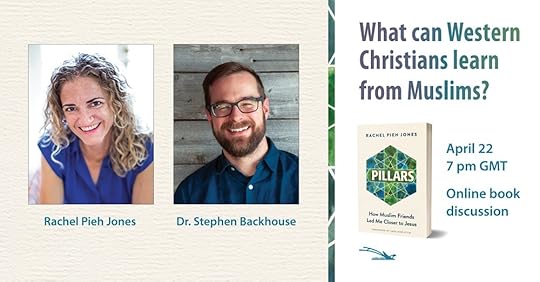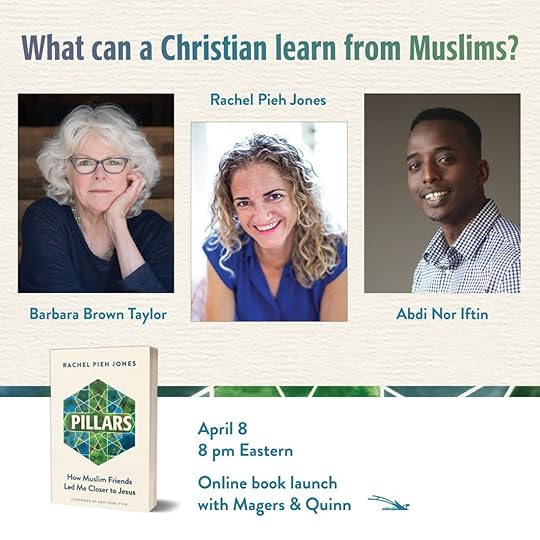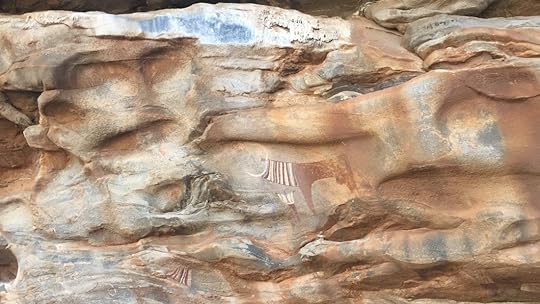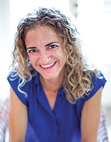Rachel Pieh Jones's Blog
August 2, 2021
Book Review: Becoming All Things
Becoming All Things: How Small Changes Lead to Lasting Connections Across Cultures
By Michelle Ami Reyes
![Becoming All Things: How Small Changes Lead To Lasting Connections Across Cultures by [Michelle Reyes, Thabiti Anyabwile]](https://i.gr-assets.com/images/S/compressed.photo.goodreads.com/hostedimages/1627996790i/31726056.jpg)
I am a white American Christian. I have lived in Muslim-dominant countries in the Horn of Africa since 2003. I tell you this before beginning my review of Becoming All Things because my position in the world impacted my reading of this book. I have struggled and grown, struggled and grown, in how to talk about and understand the racial dynamics of my life and I’ve been hungry for three things specifically. First, how do race and faith intersect and interact? Second, what are some practical things for me to engage in that will help me continue to learn and grow? And third, how do I help the people I shepherd grow in this area?
Becoming All Things addresses each of these three questions. Reyes writes with courageous compassion, refusing to shy away from difficult topics, refusing to let people remain stagnate. She writes with vulnerable hope. It is evident in these pages that Reyes has examined her own heart and perspectives and believes that the combination of vulnerability on her part and her push for Christians to do better will make a difference.
Reyes urges readers to explore our own cultural history. “Learning to value your cultural identity means delving into your family’s specific history” (18) and this is an excellent place to start. I confess that I grew up as a White suburban Minnesotan Baptist with the idea that my life was somehow “normal”, that I didn’t have culture. Life in the Horn of Africa quickly disabused me of this naivete. For readers not immersed in a place so different from their own, Reyes provides questions as a launching pad from which to begin learning your culture and history. She also asks us to explore how that culture impacts our faith.
Moving beyond looking inward, Reyes urges people to consider the other person’s position in the world, and their perspective. She writes, “The most honoring thing we can do for a person of another culture is to give them the dignity of defining themselves. This practice takes the power and ability to place value judgments on others out of our hands and challenges us to see someone the way they want to be seen, not according to how we want to label them.” (41) Again, to look at my own experience, bringing this attitude toward Somali and Muslim friends has made a profound difference in how we relate. We must be humble and curious as we allow others to define themselves. This will help us to ask better questions, to not operate out of harmful assumptions, and to get to know people as individuals, created in the image of God, each one unique.
Grounded in scripture and rich with practical steps, I highly recommend this book. In particular, I recommend it for groups: book clubs, Sunday Schools, neighborhood gatherings, families. I plan to use some of the material with our staff in Africa as we reckon with race in our context. Books like Becoming All Things are useful individually, but the concepts and lessons will become even more memorable and life-changing when read in concert with others on the same journey.
I encourage you to go find a copy of this excellent book and will conclude with Reyes’ words: “Justice is not a distraction from the gospel. It is a core message of the gospel. The life of Jesus declares this to be true, and if you want to prioritize the gospel in your life, then the pursuit of justice on behalf of others must be an essential component of your faith.”
Find Michelle Reyes on Instagram and Twitter
The post Book Review: Becoming All Things first appeared on Rachel Pieh Jones.June 9, 2021
Where You Can Find Me Online
I am rarely blogging these days. But I am still creating contact and connecting with readers and would love to stay in touch.
During Covid, I made the switch to Substack. Now, the best way to stay in touch is via email or one of my two Substack newsletters. You can find my email here:
Or join the Do Good Better or Stories from the Horn newsletter communities.
Do Good Better includes links to my essays, speaking engagements, podcasts, personal updates, as well as new essays for that community.
Stories from the Horn is a bi-weekly newsletter which includes links (and sometimes commentary) on the most important or interesting news and articles from and about the Horn of Africa. It will also occasionally include some personal updates.
Do Good BetterJoin the community at Do Good Better where we are dreaming of a more whole and healed world and diving into challenging conversations about how to actually participate in creating a better future.Stories from the HornSign up for my newsletter Stories from the Horn to receive links to all the important news stories in and about the Horn of Africa.The post Where You Can Find Me Online first appeared on Rachel Pieh Jones.April 20, 2021
APRIL 22ND 7-8:30PM GMTSign up here!Can Christians and Mu...
APRIL 22ND 7-8:30PM GMT
Sign up here!Can Christians and Muslims work together?Meet Rachel Pieh Jones, Rebecca Dali, Abdallah Rothman, Steve Gumaer, Stephen Backhouse, and Ian Barth.In this live online event, Plough’s Ian Barth introduces Pillars in conversation with author Rachel Pieh Jones and others.
When Rachel Pieh Jones moved from Minnesota to rural Somalia with her husband and twin toddlers eighteen years ago, she was secure in a faith that defined who was right and who was wrong, who was saved and who needed saving. She had been taught that Islam was evil, full of lies and darkness, and that the world would be better without it. In Pillars, Jones recounts, often entertainingly, the personal encounters and growing friendships that gradually dismantle her unspoken fears and prejudices and deepen her appreciation for Islam. Unexpectedly, along the way she also gains a far richer understanding of her own Christian faith.
 Rebecca Dali is a strong advocate to victims of religious violence in the northern part of her country, Nigeria. She devotes her time and energy to help widows and orphans, victims of Boko Haram’s insurgency through her organisation, the Center for Caring, Empowerment and Peace Initiative, which she founded in 1989.
Rebecca Dali is a strong advocate to victims of religious violence in the northern part of her country, Nigeria. She devotes her time and energy to help widows and orphans, victims of Boko Haram’s insurgency through her organisation, the Center for Caring, Empowerment and Peace Initiative, which she founded in 1989.
 Abdallah Rothman is the Principal of Cambridge Muslim College and holds an MA in Psychology from Antioch University and a PhD in Psychology from Kingston University London. He is active in interfaith dialogue.
Abdallah Rothman is the Principal of Cambridge Muslim College and holds an MA in Psychology from Antioch University and a PhD in Psychology from Kingston University London. He is active in interfaith dialogue.
 Steve Gumaer and his wife, Oddny, founded Partners Relief & Development in 1994 as an international aid organization that works in war zones. Steve is Partners’ president.
Steve Gumaer and his wife, Oddny, founded Partners Relief & Development in 1994 as an international aid organization that works in war zones. Steve is Partners’ president.
 Stephen Backhouse is a political theologian, church historian and expert on the life and thought of Søren Kierkegaard. He is the host of the Tent Theology Podcast.
Stephen Backhouse is a political theologian, church historian and expert on the life and thought of Søren Kierkegaard. He is the host of the Tent Theology Podcast.
April 4, 2021
Are you Afraid of Muslims?
Pillars: How Muslims Led Me Closer to Jesus is launching tomorrow, April 6! I don’t have a copy yet so if you get yours, will you post a photo and tag me so I can see it out in the world? I should get my shipment this week, insha Allah.
And, will you leave a review on Amazon please? That really helps with visibility. Thanks and you’re amazing!
I wrote the book with several things in mind, one of which is that I hope to de-mystify Islam. I’m not teaching about Islam, per se, as I’m not a Muslim. But I write about things I’ve learned and how I’ve experienced it as an outsider. I hope this will inspire others to not be afraid but to see potential for growing in faith, building peace, and creating a beautiful community.
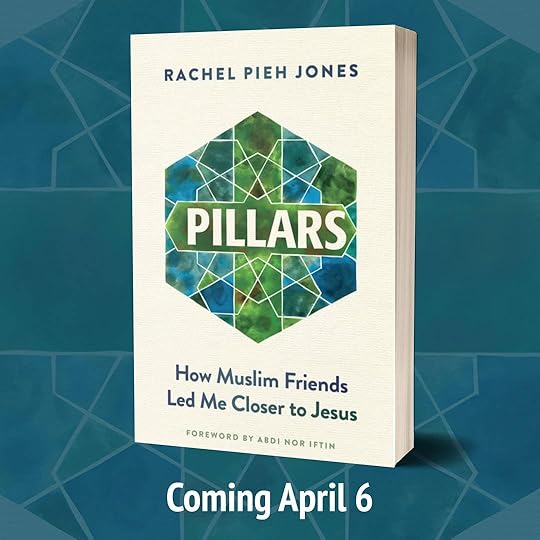 Buy Pillars here!
Buy Pillars here!
Are you afraid of your toddler? Are you afraid of your dog?
Are you afraid of Muslims? Terrorists? I say “Muslims” and “terrorists” because media outlets, some politicians, and some religious leaders want us to believe the two words are synonymous.
Franklin Graham and other American Evangelicals seem to believe we should be afraid of Muslims and that we are at war with Muslims both in the US and abroad. We all know about the so-called Muslim ban former President Trump instituted. Graham also said, several years ago, that immigration needs to be closed to Muslims, that we are under attack. He isn’t alone in this kind of ignorant fear-mongering. Over 160,000 people liked his Facebook post.
In Jesus and John Wayne, Kristin Du Mez noted that evangelical Christians are the most likely Christian group to see Islam as a threat. Jordan Denari Duffner has a book coming out in May called Islamophobia: What Christians Should Know (and do) about Anti-Muslim Discrimination. One of the reasons she wrote the book is that this is all too real and serious.
In the United States in 2013, three people were killed by terrorists (who were Muslim), all three at the Boston Marathon. That same year, five people were shot by gun-wielding toddlers, and about 34 died of dog bites.
Why didn’t Graham insist we prohibit toddlers inside our borders? Why hasn’t anyone called for a moratorium on dog ownership?
I think I know, partly, why. Americans are comfortable with toddlers and dogs, many of us know a toddler or a dog. But how many American Christians know Muslims? I mean really know them not just point to them on the street.
I have visited churches in Minnesota and people say, “Aren’t you afraid to live there? Aren’t all those Muslims trying to kill you all the time?”
No. No, I am not afraid and no, they are not trying to kill me. My daughter’s teachers? The man who pumps my gas? The running coach? It would be laughable if these American Christians weren’t so earnest.
They say, “I’m afraid to go to Target because Muslims have taken over, working at all the cash registers.” How is it that a person of a different religion working at a cash register can strike fear into hearts? How have we become so divided that we will turn a stranger into an enemy?
I think right there is the problem. We have become so divided that Muslims are strangers rather than friends, neighbors, and coworkers. We isolate and segregate and so we don’t know each other on a human level. We fear the unknown. We fear the unfamiliar and we fear difference. We’re threatened by it and so we hunker down, build barriers, throw stones.
But Christian faith calls us to not be afraid and to live a life of love, which casts out fear. We are to welcome the stranger, care for the outcast, bless the foreigner or alien.
Carl Medearis wrote to Graham: If “Muslims” are your enemies, it’s clear what Jesus calls us to do with enemies. And if these “Muslims” are your neighbors (and many of them are), it’s clear what Jesus asks us to do with neighbors. Either way I think you’re stuck. You gotta love em.
And Marilyn Gardner wrote: To build relationships with people of other faiths is not compromising our faith. Rather, it’s living out a faith that is not threatened but firm.
I think as Christians get to know Muslims on an individual basis they will discover Muslims also grieve when people are shot, they also are horrified when marathoners are bombed, they reject violence.
Inflammatory words and religious-based immigration bans only increase fear and divisions. This is not the way of Jesus or the Kingdom.
Discussion Topics:
How can we help each other move from fear to faith?How do we speak up about the fear-mongering about Islam? How do we prepare ourselves to speak truth and love in the face of fear?How can you grow in building a cross-religious friendship?For more:
Carl Medearis: An Open Letter to Franklin Graham
Marilyn Gardner: Dear Mr. Graham, Let Me Introduce You to Some Friends
For more about building relationships across religious boundaries, check out Pillars.
The post Are you Afraid of Muslims? first appeared on Rachel Pieh Jones.March 18, 2021
Book Launch Party!
I have goosebumps thinking of Barbara Brown Taylor reading my words.
I cried when I read Abdi’s foreword.
In a world of so much grief, anger, and division this is an event to celebrate hope and connection.
There is goodness. Sometimes we must fight to see it, but is there.
There is beauty. Some of my favorite images of Djibouti are the desert with a single flower. Or a bougainvillea bush tangled in barbed wire. Or the sunrise over a garbage dump. Beauty will insist on itself.
We would love to see you at this book launch party!
Sign up here!The post Book Launch Party! first appeared on Rachel Pieh Jones.December 20, 2020
Mary, Emptied
My friend Jess talked recently about the holiness of feeling empty. I had read an article for grad school about breastfeeding as an entrance into theology, breastfeeding as spiritual practice. We do not talk about this enough in our faith teachings or sermons. Have you ever heard a Christmas sermon about the pain, blood, and visceral reality of Jesus being born? Have you heard a public meditation on what it might have been like, or meant, for Mary to lift this tender newborn to her breast to feed him? How much do we miss when we neglect these very female aspects of our spirituality and faith stories?
I thought about my friend’s words of emptiness and thought about Mary.
How did Mary feel after Jesus was born?
I don’t mean in her emotions, we know she paid attention to all the events around Jesus’ birth and early years and pondered them in her heart.
I mean how did she feel in her physical body? How would this pregnancy compare to future pregnancies? After Jesus was born did she feel strangely emptied, her womb no longer the dwelling place of the divine? Her body no longer a shelter for the sacred?
(If you’d like to hear me read this out loud, check out my IGTV on Instagram)
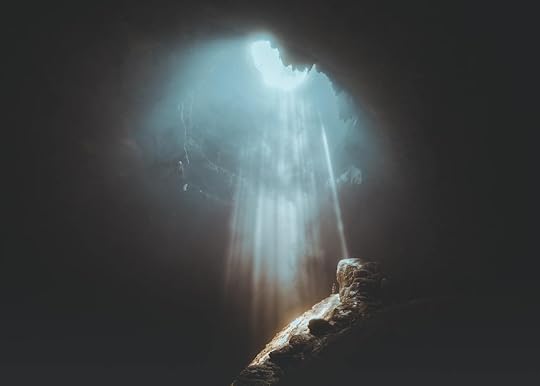
Mary, Emptied
Mary
breathed into
and full
Mary,
belly growing
breasts filling
ankles swelling
bladder squishing
Mary
kicked from inside by tiny feet
plagued by strange cravings
Mary
hungry, always so hungry
back aching and no comfortable way to sleep
Mary
the fire, the pressure, the need, the terror, the thrill, the release
The Word became flesh and
Mary
emptied.
What did this feel like?
Was there a hole where the holy had been?
Was there an ache to be filled with God again?
Was there a relief to release this baby into the world,
your body no longer the sole container of eternal justice and hope?
Was there grief because you could no longer protect this gift with the power of your own body, flesh, blood, bone, uterus?
Mary
arms filled with love
belly poured out,
When did you next feel so filled?
Or did you walk the dusty roads of Palestine
ever aware you were now emptied of the Divine?
The post Mary, Emptied first appeared on Rachel Pieh Jones.
December 6, 2020
Leaving Demons Behind
…5,000-year old paintings proliferate inside caves thirty-four miles outside Hargeisa, Somaliland, in an area called Las Geel. Some paintings are possibly as old as 7,000 years. Who painted them and why is unknown. Exactly what they represent is unknown. Who will protect them is also unknown.
Fear of jinn, or mischievous little demons, protected these paintings for centuries as people feared becoming cursed or possessed. Some people said the paintings were drawn with human blood. Goat herders avoided the caves unless sudden thunderstorms drove them inside for protection.
I grew up believing fear was a sin. I was also afraid of everything, which left me in a constant state of guilt. God told Joshua, “Do not be afraid.” Almost every time an angel spoke with a human, the angel first said, “Do not be afraid.” What was I supposed to do with my fear of heights, fear of adults, fear of talking to a stranger on the telephone, fear of a bad grade? My fears were trivial, not like the fears Somali herders felt about jinn, but they were still damning.
As an adult, a longing to be free from fear pushed me toward scary things and I moved to Somaliland in 2003. This felt like one way my faith could work itself out in action and with trembling. What I didn’t yet understand is that facing fear gives faith the opportunity to actually be faith…
The post Leaving Demons Behind first appeared on Rachel Pieh Jones.
Leaving Demons BehindLeaving the Little Demons Behind. An essay about exploring history and legend in Somaliland. LInk in profile to read the full essay. 5,000-year old paintings proliferate inside caves thirty-four miles outside Hargeisa, Somaliland, in a
…5,000-year old paintings proliferate inside caves thirty-four miles outside Hargeisa, Somaliland, in an area called Las Geel. Some paintings are possibly as old as 7,000 years. Who painted them and why is unknown. Exactly what they represent is unknown. Who will protect them is also unknown.
Fear of jinn, or mischievous little demons, protected these paintings for centuries as people feared becoming cursed or possessed. Some people said the paintings were drawn with human blood. Goat herders avoided the caves unless sudden thunderstorms drove them inside for protection.
I grew up believing fear was a sin. I was also afraid of everything, which left me in a constant state of guilt. God told Joshua, “Do not be afraid.” Almost every time an angel spoke with a human, the angel first said, “Do not be afraid.” What was I supposed to do with my fear of heights, fear of adults, fear of talking to a stranger on the telephone, fear of a bad grade? My fears were trivial, not like the fears Somali herders felt about jinn, but they were still damning.
As an adult, a longing to be free from fear pushed me toward scary things and I moved to Somaliland in 2003. This felt like one way my faith could work itself out in action and with trembling. What I didn’t yet understand is that facing fear gives faith the opportunity to actually be faith…
The post Leaving Demons BehindLeaving the Little Demons Behind. An essay about exploring history and legend in Somaliland. LInk in profile to read the full essay. 5,000-year old paintings proliferate inside caves thirty-four miles outside Hargeisa, Somaliland, in an area called Las Geel. Some paintings are possibly as old as 7,000 years. Who painted them and why is unknown. Exactly what they represent is unknown. Who will protect them is also unknown. Fear of jinn, or mischievous little demons, protected these paintings for centuries as people feared becoming cursed or possessed. Some people said the paintings were drawn with human blood. Goat herders avoided the caves unless sudden thunderstorms drove them inside for protection. I grew up believing fear was a sin. I was also afraid of everything, which left me in a constant state of guilt. God told Joshua, “Do not be afraid.” Almost every time an angel spoke with a human, the angel first said, “Do not be afraid.” What was I supposed to do with my fear of heights, fear of adults, fear of talking to a stranger on the telephone, fear of a bad grade? My fears were trivial, not like the fears Somali herders felt about jinn, but they were still damning. As an adult, a longing to be free from fear pushed me toward scary things and I moved to Somaliland in 2003. This felt like one way my faith could work itself out in action and with trembling. What I didn’t yet understand is that facing fear gives faith the opportunity to actually be faith... first appeared on Rachel Pieh Jones.
October 12, 2020
One year of Stronger than Death: What people wish I had done differently
The most critical pushback I have experienced for the story of Stronger than Death has been from American Christians. We are a hard group to please!
I told a story and tried to be as faithful as possible to the research, interviews, letters, and photographs used to uncover that story. But I’m telling the story of a woman I never met, who is now dead. There is, by necessity, interpretation.
I also told a story which intersects with my own life, which was why I made the ultimate decision to place myself in the book, something I tried hard to avoid at first. This means at times I interact with the story I’m telling. Some readers told me they wished I had presented my own opinions about Annalena’s choices more firmly, or that I had pointed out where I (or they, or they assumed that I) disagreed with her thoughts or behavior. Maybe they’re right, I’m not sure. This isn’t my story and it isn’t a story of a worldview or a religious view in the way some readers hold it. It is Annalena’s, filtered through mine. I stand by what I wrote, which does make some people with some worldview uncomfortable.
This is not a missionary biography, which some readers read it as, because she was a Christian Italian living internationally and because I am a Christian American living internationally. But Annalena said herself that she was not a missionary. It isn’t a “how-to” book of how to live among people of a different religion and culture or of how to treat sick people or of how to develop systems of care or of how to change people’s minds about religion. Readers don’t have to agree with her choices, I don’t agree with all her choices. That doesn’t mean we shouldn’t read her story. If I could only read things I agreed with, well, that doesn’t leave me with much of anything and would be pretty boring. When I read things I disagree with, I am forced to respond to it, forced to figure out why I don’t agree, what I might do differently. This is what living abroad does for me, I live among people who see the world very differently to how I see it. This is fantastic for personal growth.
This is not a book that presents “The Gospel,” meaning it does not present a step by step guide of becoming a Christian as Evangelicals understand it. There is no Bridge Illustration, no Romans Road, no Sinner’s Prayer. Which I am comfortable with for all kinds of reasons I won’t go into here (teaser for Book Two!).
There is just a story of a woman who chose radical love both for people and for Jesus. She took the words of Jesus seriously, more seriously than almost anyone else I’ve read about or known. Give to those who ask. You can’t serve both God and money. Blessed are the poor. And I do find that inspiring.
Imagine if we all did that: chose radical love. What a world! We might not be so angry, broken, and divided.
I do know that some people wish I had written a more religious book while others wish I had written a more scientific book and others wish I had written a “how-to” book and others wish I wasn’t a white woman writing about a white woman in Africa (there is a whole chapter to address that).
I wrote the book I wrote. I will end by letting one reader’s words stand. This was written down after I gave a talk at a school in Djibouti. The person who wrote it read it out loud during a small group discussion afterwards. I asked for permission to photograph it because I found the words so moving.
Plough: Stronger than Death: How Annalena Tonelli Defied Terror and Tuberculosis in the Horn of Africa
Indiebound: Stronger than Death: How Annalena Tonelli Defied Terror and Tuberculosis in the Horn of Africa
Barnes and Noble: Stronger than Death: How Annalena Tonelli Defied Terror and Tuberculosis in the Horn of Africa
The post One year of Stronger than Death: What people wish I had done differently first appeared on Rachel Pieh Jones.
October 9, 2020
One year of Stronger than Death: What has been the impact of this book?
Writing the book impacted me by the sheer joy of immersing myself in Annalena’s story. I have been challenged in how much I am willing to give up, in my idea of what it looks like to love people and to be a good neighbor, in how I think about Jesus and how I choose to embody my faith convictions.
I believe a little bit deeper that I am loved. How did this come from writing a book? I called one of my sisters while on book tour, almost in tears. I told her I felt like such a fraud, fake, idiot, what was I even thinking in putting my creative work out there and asking people to buy it and respond to it…She said some loving, gentle things, and then basically told me to knock it off. “Are you having fun? Do you think maybe you’re good at this?” she asked. “You aren’t forcing people to read the book or come to your events. They come because you wrote a good book and because they either want to meet the author, or they love you and want to support you.”
It was positively mind-boggling to accept this. To believe it. And yet, how could I not? I felt so loved. So. Loved. It was such a powerful experience to meet people across the country and to reconnect with old friends. I can’t even put words to it, and I’m a writer. Y’all moved me to tears multiple times.
The book has not changed my life in remarkable ways. People often ask how it is selling and I say, it could always sell better (go get it here)! I don’t really know exactly. I do know that I broke even with how much I spent on the writing and research process. Which means I earned approximately $0.00 on my time spent writing, okay a little bit more but it gets complicated really quickly. That seems about average for authors. Maybe? Where on earth does the idea come from that writers are rolling in money? Sure, a few are. But the rest of us hope to break even and when we do, we’re thrilled. We aren’t in it for the money and certainly not the fame – which I do not have and do not want. We are in it for the work and the story and the delight and the compulsion.
The book has led to beautiful conversations with Somali Muslims, with American Christians, with French Muslims, with atheists…with people from any place and any religious background. It has opened up new friendships and connections and increased my belief that people are supportive, caring, and kind. Sometimes. But enough times that I will settle there in how I view “us.”
I had a couple of book events in Djibouti and hosted a giveaway for free copies. Many Djiboutians can’t afford the luxury of purchasing a hard cover book, or any book. It was with great joy that I totally rigged the drawings to make sure local readers won the free books and I’ve since heard from a few of them that they are powerfully moved by Annalena’s story.
One told me, “I want to love and serve the poor like Annalena did. She was motivated by her love for Jesus, and I want to live in a similar way.”
My own increased belief that I am loved, new friendships, inspiring a few people to care for the poor among them, and giving people a book they are glad to have read…these are some of the gifts and impacts of the book in this first year.
Plough: Stronger than Death: How Annalena Tonelli Defied Terror and Tuberculosis in the Horn of Africa
Indiebound: Stronger than Death: How Annalena Tonelli Defied Terror and Tuberculosis in the Horn of Africa
Barnes and Noble: Stronger than Death: How Annalena Tonelli Defied Terror and Tuberculosis in the Horn of Africa
The post One year of Stronger than Death: What has been the impact of this book? first appeared on Rachel Pieh Jones.

